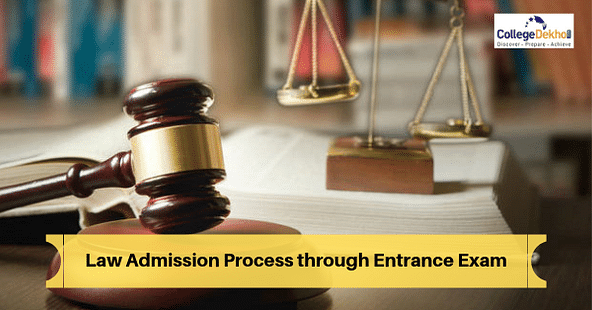Planning to study Bachelor of Law (LL.B) in India? Discover all the important details regarding LL.B admission in India 2023. Find out the admission process, eligibility criteria, entrance exams, top colleges, etc. here in this article.
- Law Courses in India 2023
- Eligibility Criteria for LL.B 2023
- Entrance Exams for 3-year And 5-year LL.B Courses
- National Level Law Entrance Exams 2023
- College/ University Level Law Entrance Exams 2023
- State Level Law Entrance Exams 2023
- Top LL.B Colleges in India 2023
- Private LLB Colleges in India Accepting Law Entrance Exams
- Faqs

An undergraduate legal degree is known as a Bachelor of Law, Bachelor of Legislative Law, Bachelor in Laws and Legislation, or LL.B. There are lots of prestigious colleges and universities in India that offer the LL.B degree which is often termed as the first professional law degree. Getting a degree in law is quite prestigious and very popular as a profession. For many years students have shown great interest in getting a legal degree. Law aspirants who are looking for LL.B admission in India 2023 can find all the relevant information here.
LL.B is a 3-year Bachelor of law degree that is offered to aspirants by renowned law colleges after clearing the law entrance examination. The LL.B degree can be studied by those who have a Bachelor’s degree in any stream. Almost all the colleges offering the LL.B degree are regulated and supervised by the Bar Council of India (BCI). The 3-year LL.B degree is divided into 6 semesters and candidates can only get the degree if they complete all the semesters of this course. As a part of the LL.B course, candidates have to take part in regular theory classes, moot courts and internships.
Candidates who match all the eligibility requirements may apply for admission to the 3-year LLB or 5-year LLB depending upon their preference and long-term career goals. Candidates can get admission either via an entrance exam which can be conducted at the national level, state level, or at the university level OR candidates can also get admission by earning the required minimum qualifying marks at the 10+2 level from a recognized school board.
In India, more than 1,000 law schools and colleges will admit students to LLB programs in 2023. There are two types of LL.B programs: 3-year and 5-year Integrated Law courses . Both competitive entrance exams and the direct admission procedure are used to determine admission to LLB 5-year and 3-year programs. As a result, if you are a law student interested in admission to an LLB program, it is worthwhile to learn about the many LLB programs available in India, as well as the top universities, their admissions policies, and their qualifying requirements. To learn more about LLB admission in India in 2023, as well as other pertinent details, read the full article below.
Law Courses in India 2023
There are several types of LL.B courses offered by various law institutions in India, these law degrees are majorly divided into a 3-year LL.B program and five-year integrated LL.B programs. However, the majority of law colleges in India provide courses in an integrated setting. The LL.B designation denotes a law bachelor's degree. The majority of institutions in India combine the LL.B course with the BA, BBA, and B.Com programs, then add LL.B to create a 5-year integrated law program. Law school demands a lot of endurance, enthusiasm, credibility, and other qualities. The career of a lawyer is well-respected, one of the highest-paying, and offers law graduates the greatest degree of professional independence.
The law degrees offered under 3-year and five-year integrated LL.B programs are mentioned below:
LL.B Course Type | Degrees Offered |
|---|---|
5-year integrated LL.B (Dual degree program) | BA LL.B, BBA LL.B, BSc LL.B, BCom LL.B, BTech LL.B |
3-year LL.B | Bachelor of Law (LL.B), LL.B (Hons.) |
Now, let’s take a look at each law degree and what it encompasses in order to get a good idea of what the law degree is all about. This will further help candidates in making the right decision to choose an appropriate law degree that aligns with their long-term and short-term career goals.
LL.B (3-year degree)
Candidates who have passed their class 12th board exams with at least a 50% overall score or an equivalent CGPA from a recognized school board are eligible to enrol in the three-year LL.B program. It is a prerequisite for entrance to the practice of law. The course is designed to provide thorough legal education and complies with the requirements set forth by the Bar Council of India (BCI) . The three-year LL.B program is organized around multidisciplinary legal research and hands-on training. In order to generate lawyers who can handle the difficulties of the twenty-first century, the program enables law students to bridge theory and practice.
BA LL.B (5-year degree)
Candidates may enrol in the BA LL.B (Bachelor of Arts - Bachelor of Legislative Law), a five-year integrated LL.B program, after passing Class 12. The Law course combines the Humanities and Law streams, allowing students to take courses in history, sociology, administrative law, criminology, family law, and other legal topics. Most law schools operate on a semester system, which divides the five-year course into 10 semesters. The leading law schools in India charge between Rs 1.5 and 2.8 lakhs annually for the BA LL.B program.
To be admitted to the BA LL.B program, students may take a variety of national and state-level entrance exams, including CLAT, AILET, and MH CET Law. The semester system, which divides a five-year BA LLB degree into ten semesters, is used by the majority of BA LL.B institutions.
The BA LL.B degree program put more emphasis on classroom instructions as well as training seminars, moot court sessions, clinical internships, etc. for its students. After completing the BA LL.B program, students will be able to precisely prepare legal documents, and they will also have a competent and thorough knowledge and understanding of Indian laws and how they are used in all facets of society. After completing their five-year integrated BA LL.B degree, candidates can sit for the AIBE exam and register themselves with the Bar Council of India (BCI). The BA LL.B program prepares students for a highly sought-after and illustrious profession in the legal field with excellent opportunities to work for both the public and private sector organizations.
BBA LL.B (5-year degree)
Another 5-year combined program is the Bachelor of Business Administration and Bachelor of Legislative Law (BBA LL.B) which leads to a professional degree. The combined law and business administration curriculum known as BBA LL.B teaches students both legal and business ideas. The knowledge and comprehension of Commerce courses like Principles of Management, Financial Accounting, Effective Communication, Computer Applications, and so on are initially distributed to candidates pursuing BBA LL.B.
Following the above-mentioned commerce subjects, BBA LLB candidates are taught BBA LL.B legal subjects such as Constitutional Law, Property Law, Company Law, Administrative Law, Civil Law, and Criminal Law. An applicant has a maximum of eight years to complete their BBA LL.B program. BBA LL.B students are taught a wide range of topics through classroom instruction, clinical internships, moot courts, case studies, etc. as part of a 5-year integrated BBA LLB curriculum.
Admission to the BBA LL.B degree is determined by results from entrance exams for law, including the CLAT, LSAT, and institute-specific entrance tests, like the SLAT. For the BBA LL.B program, students must have at least passed their class 12 board exam or an equivalent exam.
Students who complete the BBA LL.B curriculum are prepared for jobs as corporate lawyers, attorneys, and other legal roles. Students pursuing a BBA LL.B degree will have numerous opportunities to work in prominent law offices across the nation, and in international organizations as legal advisors, and as independent attorneys. A BBA LL.B graduate can expect to earn an average annual salary of between INR 3 and 10 LPA, based on their professional experience, intelligence, and talents.
B.Com LL.B (5-year degree)
B.Com LL.B is a professional five-year integrated law program that provides knowledge of two different disciplines i.e Commerce and Law. In the integrated Bachelor of Commerce and Bachelor of Legislative Law (BCom LL.B) program, candidates are taught both business and legal topics. Business Statistics, Business Communication, Auditing, Economics, and other topics related to commerce are some of the disciplines that candidates for the BCom LLB program study. In addition to this, applicants are instructed in law-related topics such as contract law, consumer protection law, constitutional law, criminal law, legal terminology, statutory interpretation, and other related topics.
Candidates must pass all of the exams in eight years, which is the maximum time allowed to complete the B.Com LL.B course, which has ten semesters. Aspirants are taught a variety of topics as part of an integrated BCom LLB degree through classroom instruction, case studies, and moot courts.
B.Com LL.B, a five-year undergraduate dual degree, is specially created for individuals who are interested in business but do not want to limit themselves to that field. The course equips students with business expertise as well as legal knowledge that is relevant to their line of work. This program offers two degrees in five years instead of the normal six since it is an integrated curriculum, which helps students broaden their areas of study and, in turn, their employment options.
The different job profiles that B.Com LL.B graduates can take up are mentioned below:
- Corporate lawyer
- Law officer
- Assistant officer
- HR Manager
- Attorney general
- Law reporter
- Management accountant
- Teacher/ Lecturer
- Lawyer
- Legal Advisor
B.Sc LL.B (5-year degree)
B.Sc LL.B is also one of the popular integrated five-year undergraduate law degree programs also known as the Bachelor of Science and Bachelor of Legislative Law, or B.Sc. LL.B offers a combined knowledge of law and science. The course includes a total of ten semesters and five years from the date of enrollment is the maximum time allowed for the completion of this integrated law degree program. Popular law entrance examinations like CLAT, LSAT, AILET, SLAT, etc. are conducted to provide admission to law aspirants for this course in various reputed law colleges and universities. Candidates can appear for the above-mentioned law entrance exams once they complete their class 12th from a recognized school board with a minimum aggregate percentage of 50% or above(the minimum aggregate percentage depends from institute to institute).
There is often no upper age limit for taking B.Sc LL.B courses at law schools. Science and law are taught to students during the course of the five-year BSc LLB program. The law subjects are more or less comparable to what we find in BA LL.B, BBA LL.B, or B.Com LL.B, while students are given the option to choose the science subjects that interest them. The subjects included in the B.Sc LL.B program can differ from one college to another. However, the following list of typical subjects that applicants are taught as part of their B.Sc LL.B course curriculum:
Polymer Chemistry | Genetics, Immunology and Molecular Biotechnology |
|---|---|
Programming Fundamentals & Data Base Management System | Physical Pharmacy |
Internet, E-Commerce, Multimedia Tools & Information System Security | Legal Method |
Techniques of Communication, Client Interviewing & Counseling | Business Law |
Family law-I | Constitutional Law-I |
Law of Crimes-I | Advocacy Skills |
Constitutional Law-II | Law of Crimes-II |
Plant and Animal Biotechnology | Information Theory, Coding and Network Programming |
Code of Criminal Procedure-I | Law of Evidence |
Corporate Law | Jurisprudence-I |
Code of Criminal Procedure –II | Public International Law |
Jurisprudence-II | Land Laws |
Laws and Technology | Intellectual Property Right |
Electronic Devices, Circuits and IC Technology | Concepts of Chemistry |
International Trade Law | Law, Poverty, and Development |
Women & Law | Air & Space Law |
Legal Ethics and Court Craft | Drafting, Pleading and Conveyancing |
Election Law | International Commercial Law |
A few of the required skill sets that a candidate must possess if they are interested to take up a B.Sc LL.B integrated degree program are tabulated below:
Hard working attitude | Confidence |
|---|---|
Intellect | Ability to assimilate and analyze facts |
Convincing power | Good presentation skills |
Fluency | Clarity of speech |
Convincing power | Good presentation skills |
Ability to work long hours | Objectivity |
Integrity | Interest in Research |
Good logical thinking and reasoning skills | Ability to quickly draw inferences |
Eligibility Criteria for LL.B 2023
To study the 5-year Integrated law degree, candidates should have completed their 10+2 from a recognized board of education with a minimum of 50% or above. The minimum aggregate percentage may vary according to the law colleges. Before selecting a law college, candidates must first check the prospectus of their preferred law institute and ensure that they have gone through all the eligibility criteria.
All those who want to study 3-year LL.B degree must have completed their graduation. A Bachelor’s degree or an equivalent degree is a must to get into a 3-year LL.B programme. The graduation degree must be of 3 or 4 years duration. Even after completing the graduation degree, some law schools have certain percentage requirements that candidates have to meet in order to secure admission. Usually, for General category candidates, the minimum percentage requirement is 45% to 55% whereas, for SC/ ST candidates, the percentage ranges between 35% to 45%.
Entrance Exams for 3-year And 5-year LL.B Courses
A few of the popular law entrance exams conducted by various official bodies all across India to admit candidates to various law programs have been provided here. Law aspirants must check the table given below where all the important dates of the top law entrance exams in India are given. Take a look at the popular law entrance exams dates:
List of Law Entrance Exams | Application Start Date | Application End Date | Admit Card Release Date | Date of Entrance Exam | Mode of Exam | Result Date |
|---|---|---|---|---|---|---|
July 1, 2023 | November 3, 2023 | To be Notified | December 03, 2023 | Offline | December 2023 | |
August 7, 2023 | To be Notified | To be Notified | December 10, 2023 | Offline | December 2023 | |
November 10, 2022 (January & June Cycle) | January 11, 2023 (January Cycle) May 31, 2023 (June Cycle) | January 2023 (January Cycle) June 2023 (June Cycle) | January 22, 2023 (January Cycle) June 8 to June 10, 2023 (June Cycle) | Online | February 10, 2023 (January Cycle) June 24, 2023 (June Cycle) | |
3-year LLB- March 15, 2023 5-year LLB- March 1, 2023 | 3-year LLB- April 4, 2023 5-year LLB- March 23, 2023 | 3-year LLB- April 29, 2023 5-year LLB- April 14, 2023 | 3-year LLB- May 2 and May 3, 2023 5-year LLB- April 20, 2023 | Offline | 3-year LLB- May 23, 2023 5-year LLB- May 21, 2023 | |
January 21, 2023 | April 30, 2023 | To be Notified | To be Notified | Offline | To be Notified | |
December 19, 2022 | April 28, 2023 | April 28, 2023 | April 28, 2023 to May 2, 2023 | Offline | To be Notified | |
March 23, 2023 | April 22, 2023 | May 15, 2023 | May 20, 2023 | Online | June 16, 2023 | |
March 02, 2023 | April 29, 2023 | TS LAWCET- May 16, 2023 TS PGLCET- May 16, 2023 | 3 Year LLB - May 25, 2023 5 Year LLB and LLM - May 25, 2023 | Online | June 15, 2023 | |
3-year LLB- July 13, 2023 5-year LLB- July 12, 2023 | 3-year LLB- July 26, 2023 5-year LLB- July 26, 2023 | 3-year LLB- To be Notified 5-year LLB- August 1, 2023 | 3-year LLB- August 13, 2023 5-year LLB- August 6, 2023 | Offline | 3-year LLB- To be Notified 5-year LLB- To be Notified | |
January 23, 2023 | June 8, 2023 | June 16, 2023 | June 17, 2023 | Offline | June 29, 2023 | |
April 05, 2023 | May 16, 2023 | June 12 to June, 24 2023 | June 24, 2023 | Online | July 5, 2023 | |
DU LLB Entrance Exam
| March 20, 2023 | May 05, 2023 | June 03, 2023 | June 5 to June 17, 2023 June 22 to June 27, 2023 & June 30, 2023 | Offline | July 20, 2023 |
April 09, 2023 | March 30, 2023 | May 19, 2023 | May 21, 2023, to June 02, 2023 June 05 and 06, 2023 | Offline | July 15, 2023 | |
BHU UET (Law)
| March 20, 2023 | May 05, 2023 | June 03, 2023 | June 5 to June 17, 2023 June 22 to June 27, 2023 & June 30, 2023 | Offline | July 20, 2023 |
Phase 1- December 10, 2022
| Phase 1- April 05, 2023 Phase 2: May 05, 2023 Phase 3: June 04, 2023 | Phase 1- April 2023 Phase 2: May 2023 Phase 3: June 2023 | Phase 1- April 14 to 20, 2023
| Offline | Phase 1- April 24, 2023
| |
May 5, 2023 | May 31, 2023 | June 12, 2023 | June 15, 2023 | Offline | July 7, 2023 |
National Level Law Entrance Exams 2023
There are many national-level law entrance tests that candidates need to appear for to be eligible for law admissions. Various national law entrance tests include tests such as CLAT, LSAT, AILET etc which have different patterns.
Law Admissions through CLAT 2023
The Common Law Admission Test or CLAT is the most popular examination for law admissions in India. The examination is conducted for 22 National Law Universities (NLUs) across India. The NLUs consider CLAT as their primary eligibility criteria for admissions. The Consortium of NLUs conducts CLAT every year.
The law aspirants who are looking forward to taking admissions in any of the NLUs across the country must attend the CLAT 2023 counselling process where the cutoff will be determined and the student will be allocated the National Law University of their preference depending upon their marks. The NLUs across the country which accepts admission through CLAT will admit candidates into the 5 years integrated BA LL.B , B.Com LL.B or BBA LL.B stream as specified by the candidate.
Every NLU has their share of seat matrix percentages and reservations according to the directives of the Central and State government. Tentatively, around 55% of the seats at all NLUs are open for admissions for the general category of candidates. More than 25 private universities and institutes that offer LL.B courses consider CLAT scores as one of their prime criterion for law admissions.
Law Admission through LSAT 2023
The Law School Admission Test or LSAT 2023 is a national-level entrance exam. It is one of the most important law school entrance tests that most private universities require for admissions to the UG law specialisations of integrated LL.B courses. The examination is conducted in 23 cities across India. Before sitting for LSAT, the students should have a clear idea about the colleges he/ she can get admission to after passing the LSAT. Currently, there are 52 government or government-aided colleges in India that recognise the LSAT results. More than 20 private institutes also consider LSAT scores as a prime criterion of eligibility. The LSAT examination authority does not arrange any counselling sessions for college admissions through LSAT. Candidates who have an LSAT score can apply to the different colleges individually for admission to the integrated 5-year LLB courses.
Also Read: Top 20 Law Universities in India Accepting CLAT, LSAT, SLAT Scores
College/ University Level Law Entrance Exams 2023
Many universities and colleges conduct their own entrance tests for taking admissions into law courses. For example, Symbiosis University, Banaras Hindu University, Calcutta University , Aligarh Muslim University etc conduct their own law entrance examination tests for admission to the university’s law courses. There are many university-level law entrance tests out of which the most prominent are mentioned below:
All India Law Entrance Test (AILET) 2023
The All India Law Entrance Test or AILET is organised by the National Law University - NLU Delhi for admissions to the 5-year BA LL.B course or the one-year PG level LL.M course offered by the institute. NLU Delhi is the only NLU that does not accept CLAT for its admission process and conducts a separate entrance test. AILET examination is conducted across India in all the major cities for admissions to primarily NLU Delhi. However, a number of private institutes consider the score of AILET as one of the criteria for the entrance exam for UG law course admissions.
Symbiosis Law Admission Test (SLAT) 2023
The aspirants who want to take admission to the LLB courses at Symbiosis University have to appear for the entrance examination of law conducted by the university which is known as the Symbiosis Law Admission Test (SLAT) 2023. The SLAT exam is conducted by Symbiosis University for admissions to the 3-year LLB course.
Calcutta University Law Entrance Test (CULET) 2023
CULET 2023 is the examination for admission to the 5 years integrated BA LLB course at Calcutta University. The university conducts CULET for admission to its 13 affiliated law courses on-campus, Faculty of Law, Calcutta University and affiliated colleges. After the publication of the merit list, the University of Calcutta will admit students through the Calcutta University Law Entrance Test (CULET) 2023 counselling process in their preferred colleges.
Banaras Hindu University Undergraduate Entrance Test (BHU-UET) for Law 2023
The BHU-UET 2023 or Benaras Hindu University Undergraduate Entrance Test 2023 is taken for admissions to its different UG courses. The BHU-UET 2023 for the law is also conducted by the university for admission to its LLB and Integrated LLB courses.
Aligarh Muslim University Law Entrance Examination (AMU-LEE) 2023
Aligarh Muslim University is one of the best universities in India to study law. It conducts a law entrance test which is known as Aligarh Muslim University Law Entrance Examination or AMU-LEE. The AMU-LEE 2023 examination is not only accepted by AMU but is also accepted for admission to its three distance study centres located in Aligarh, Malappuram, and Murshidabad.
State Level Law Entrance Exams 2023
Some state-level law entrance tests are conducted for admission to state-affiliated universities. These tests are mostly 100% domicile in nature. For example, AP-LAWCET, MAH-LLB CET, CEE Kerala for Law etc. are some popular state-level law entrance exams. There are many other examinations that are conducted in the states of India for admission into the law courses of the respective states. Following are some of the examinations:
Andhra Pradesh Law Common Entrance Test (AP LAWCET) 2023
Sri Krishnadevaraya University, Anantapur conducts AP-LAWCET 2023 on behalf of the Andhra Pradesh State Council of Higher Education (APSCHE). The examination is conducted annually for law aspirants who wish to get into the government or government-aided law colleges in Andhra Pradesh. Around 22 colleges in Andhra Pradesh consider the score of AP LAWCET 2023 as a primary criterion for their admission process.
Maharashtra LL.B Common Entrance Test (MAH-LL.B CET) 2023
The Maharashtra government’s ‘state common entrance test cell’ conducts the CET or Common Entrance Tests for admission to multiple courses across various streams such as engineering, polytechnic, computer application, education, architecture etc. CET for Law is also one of the exams which are conducted to give Maharashtra Domicile students admission to the law colleges backed by the state. The valid score holders can apply to the Maharashtra colleges that accept the score of MAH-LLB CET 2023.
Kerala LL.B Entrance Exam 2023
Kerala LLB entrance exam is conducted by the Commissioner for Entrance Examinations (CEE), Government of Kerala for students looking forward to taking admission into both the Integrated Five-Year LL.B course and Three-Year LL.B course in the state of Kerala.
Top LL.B Colleges in India 2023
The table given below provides a list of the best LLB colleges in India. Candidates can also find the location of these colleges here along with the fee structure for LLB.
Name of the College | Location | LL.B Fees |
|---|---|---|
Delhi | Rs. 4,14,000 | |
Jaipur | Rs. 1,59,000 | |
Guntur | Rs. 3,90,000 | |
Bareilly | Rs, 1,05,000 | |
Pune | Rs. 1,11,000 | |
Jaipur | Rs. 90,000 | |
Birbhum | Rs. 2,40,000 | |
Sonepat | Rs. 1,80,000 | |
Hyderabad | Rs. 1,50,000 | |
Jaipur | Rs. 1,73,400 |
Also Read: If not an advocate, then what? Find out Alternative Career Options
Private LLB Colleges in India Accepting Law Entrance Exams
Here is the list of the top LLB colleges in India. Go through the list as per your requirement.
After appearing for the
LLB entrance exam
, the conducting body will release the list of shortlisted candidates for the counselling process. As a part of the law counselling process, candidates will have to select their preference of colleges and courses. On the basis of the candidate’s ranks and availability of seats, the seats will be allotted to them.
For any admission related assistance, feel free to either fill the Common Application Form or dial the toll-free number 1800-572-9877. You can also post your queries or concerns in the QnA zone.
For more such information, stay tuned to CollegeDekho !
Are you feeling lost and unsure about what career path to take after completing 12th standard?
Say goodbye to confusion and hello to a bright future!

FAQs
A few of the top law institutes to pursue a three-year or a five-year LLB degree program are NLSIU Bangalore, Symbiosis Law School, Christ University, Bangalore, ICFAI Law Institute, NALSAR University of Law, Hyderabad, Jindal Global Law School, Sonipat, UPES School of Law, etc.
A few of the common subjects in a three-year OR five-year LLB degree program are IPR, labor and work laws, family law, criminal law, the law of torts, consumer protection act, constitutional law, jurisprudence, criminal law, international law, trade laws, environmental law, the law of evidence, human rights, etc.
Yes, you can pursue LLB at the age of 25 and above. There’s no upper age limit to pursuing a three-year or five-year LLB degree program.
There is a plethora of scope for law graduates in various fields. One can join big private firms or public firms, or they can work as an independent entity. Law graduates can dawn multiple roles depending on their field of focus and area of specialization, they can become corporate lawyers, criminal lawyers, legal advisors, notaries, etc. The initial pay is decent and might start from 2.5 LPA further increasing with experience.
LLB is not a particularly challenging course to take compared to other professional programs like BTech and MBBS, whether it is a three or five-year program. However, the syllabus is particularly vast for five-year LLB program which demands more focus and determination to achieve good results.
The 5-year LLB degree is your best choice if you are confident that you want to pursue a career in law. When compared to 3-year LLB programs, this course not only offers the same educational benefit but also saves one academic year. Moreover, a three-year LLB degree provides you with more theoretical knowledge as compared to a five-year LLB degree which focuses more on experiential learning through moot court sessions, clinical internships, etc.
If you want to pursue a three-year LLB degree then you must have completed your graduation from a recognized university. If you want to pursue a five-year integrated LLB degree then you must have completed your class 12th with a minimum aggregate percentage of 50% or above (the minimum aggregate percentage varies from institute to institute).
The LLB degree can be of three years or five years. The five-year degree program is a dual degree program that incorporates two different curricula with the law as a common curriculum, for example - BA LLB, B.Com LLB, etc.
Yes, candidates can get admission to various law colleges in India without giving any law entrance exam. The admission without any entrance exam will be merit-based and class 12th percentage will be taken into consideration to provide admission. The merit-based admission is usually followed by a personal interview and a group discussion round/ MCQ-based written test to assess a candidate’s legal knowledge and acumen.
Was this article helpful?


















Similar Articles
What is a Good Score in MH CET Law 2025?
MH CET Law 2025 Exam Day Guidelines and Instructions
Government Jobs after LLB
List of LLM Colleges Accepting Odisha CPET 2025 Scores - Check Seat Matrix Here, Merit List
Dos and Don'ts for TS LAWCET 2025 Seat Allotment
What is a Good Score in TS LAWCET 2025?